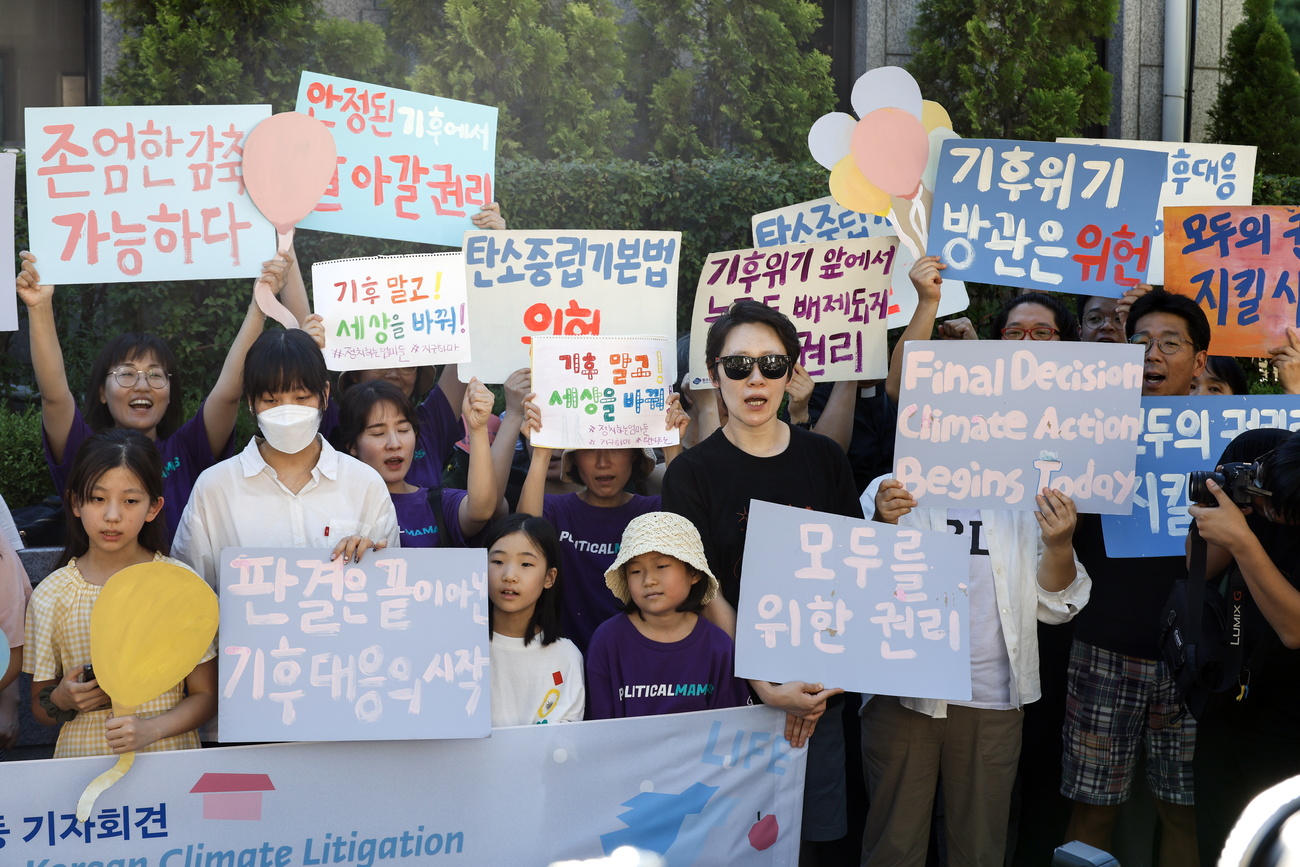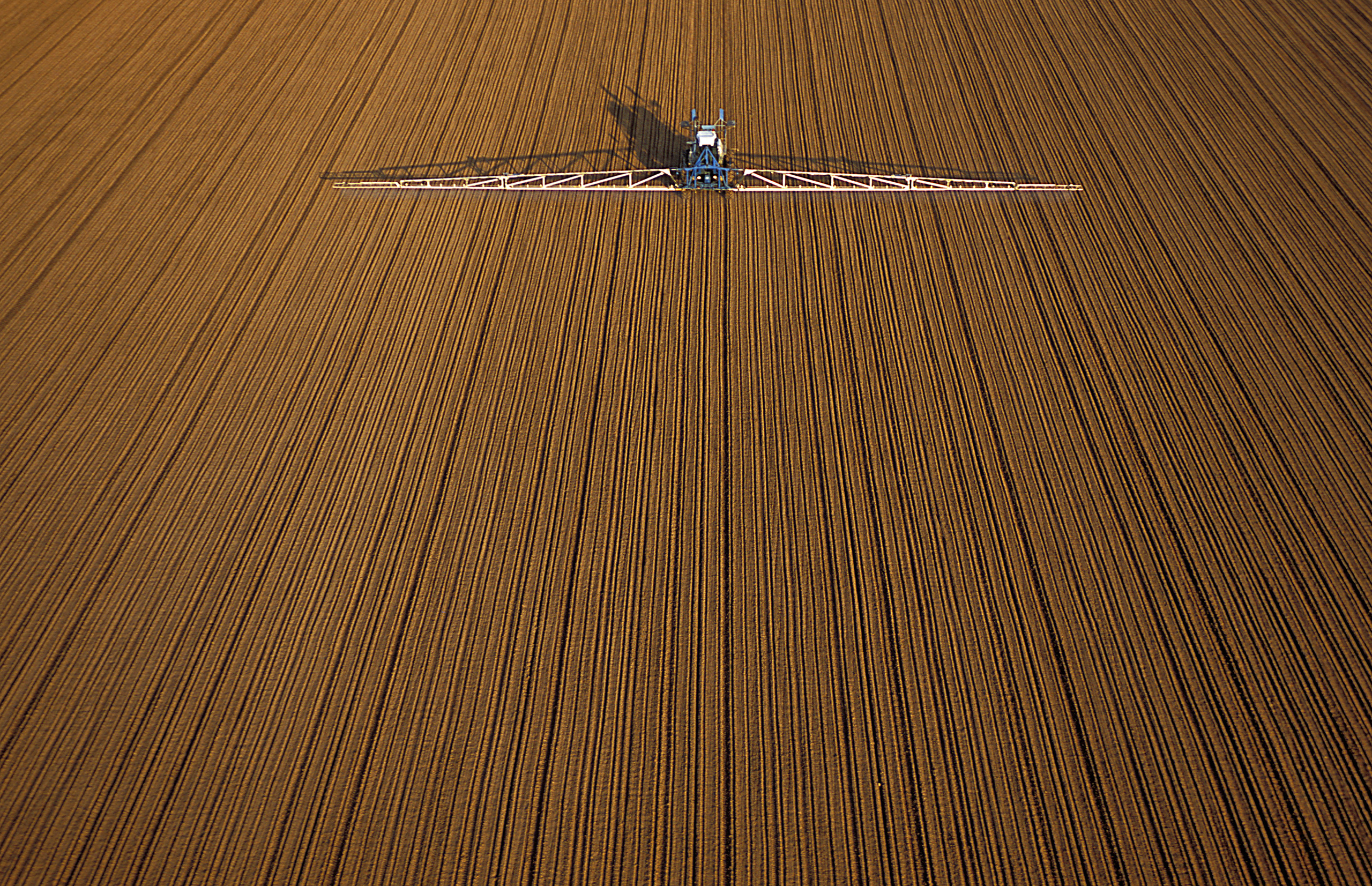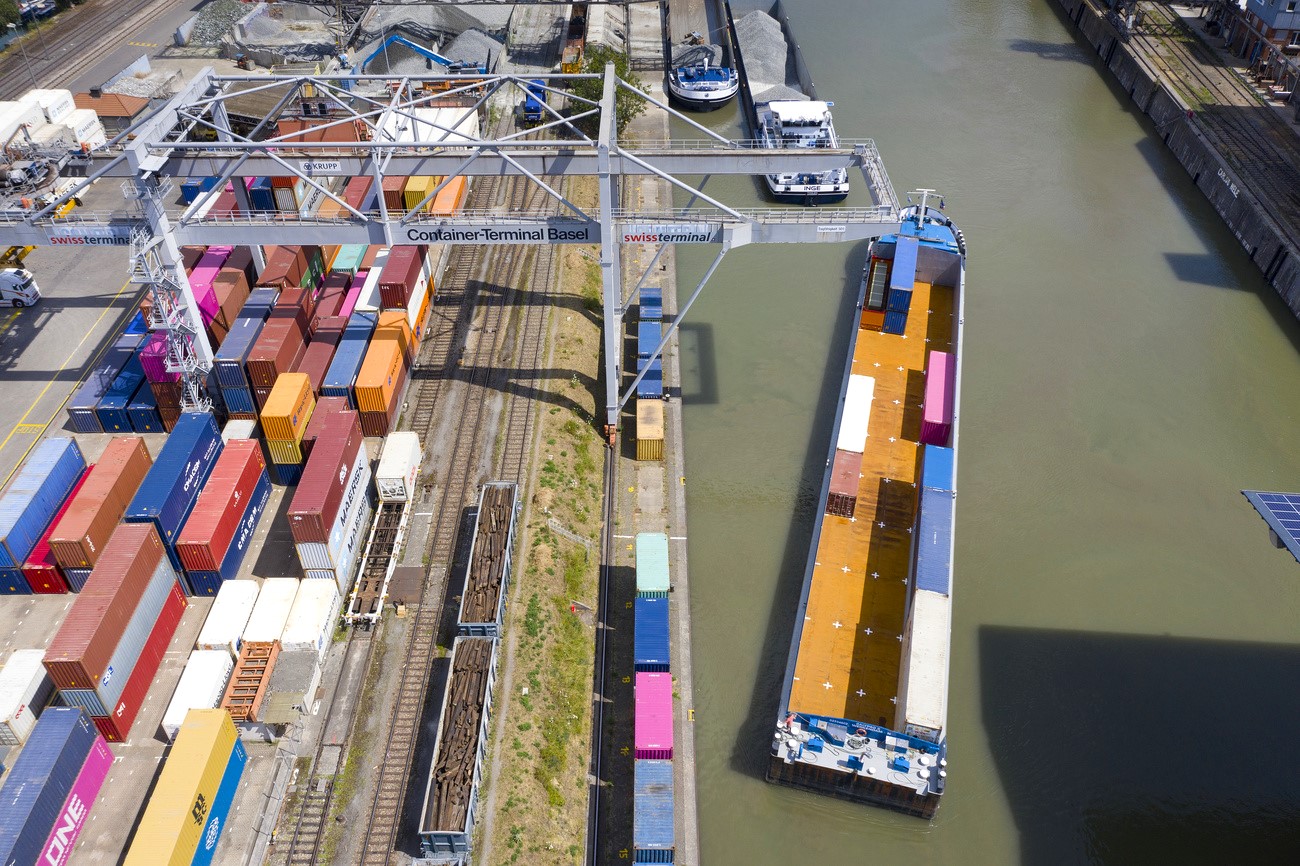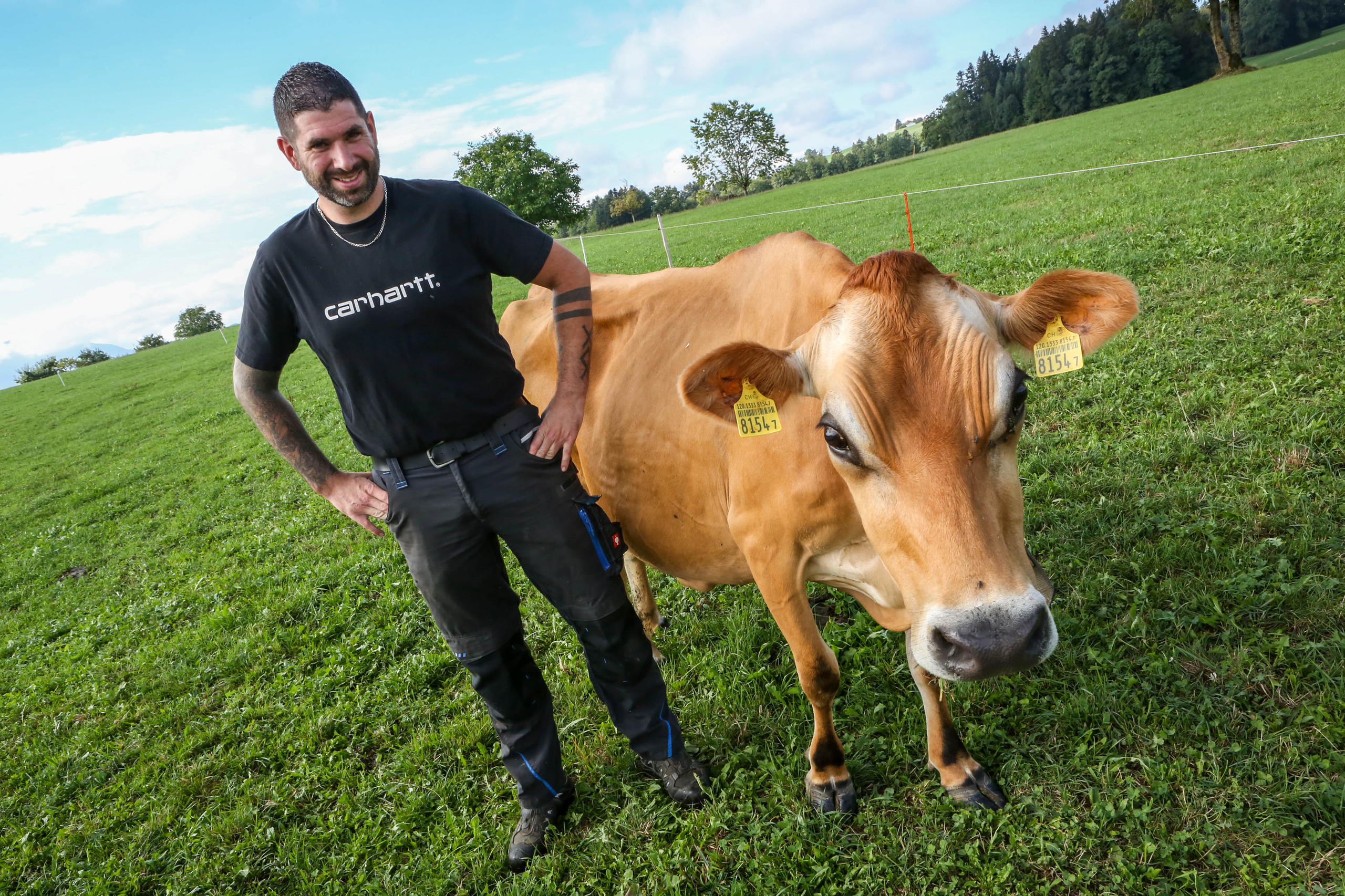Agriculture shifts from climate-change culprit to victim in new lawsuit

Agriculture is a major source of greenhouse gas emissions. But it is also one of the sectors most affected by climate change. A lawsuit in Switzerland could prompt farmers around the world to sue their governments for climate inaction.
Farmers know how to make their voices heard. They block roads with tractors or dump piles of manure in cities to express their discontent. Last year, farmers’ protests erupted against environmental policies, rising production costs and international competition in many European countries, including Switzerland.
However, a group of Swiss farmers has chosen another way – albeit a less spectacular, but no less effective, one – to express their dissatisfaction.
Nine farmers and five small agricultural associations from various cantons have launched a lawsuit against Swiss authoritiesExternal link, accusing them of not doing enough for the climate and jeopardising their existence. The lawsuit is pending before the Federal Administrative Court.
Climate lawsuits are on the rise around the worldExternal link, growing from 2,540 in 2023 to almost 2,900 in 2024. More and more individuals and associations are turning to the courts to denounce the inadequacy of governments’ climate policies or to assess the responsibility of fossil fuel companies for their CO2 emissions. Agribusiness, and livestock farms in particular, have also been targeted, as seen in Denmark, the United States, and New ZealandExternal link.
What’s different with the Swiss case compared to other climate lawsuits is that the suit is being filed by the farmers themselves. Until now agribusiness had been considered one of the culprits of climate change.
Animal farmers are generally framed as climate polluters who should be held liable for the impact their emissions have on global warming, Emily Bradeen, a policy analyst at the Grantham Research Institute on Climate Change and the Environment, writes in an email to SWI swissinfo.ch.
The farmers’ lawsuit in Switzerland “is interesting because it is turning the tables on this framing by arguing that farmers can also be the victims of climate change,” she says.
Charlotte E. Blattner, an associate professor of public and environmental law at the University of Lausanne, also sees this initiative as a paradigm shift. “It marks a big change in how farmers position themselves on environmental issues,” she says.
Meat and dairy production generates about 15% of global man-made emissions, according to the United Nations Food and Agriculture Organization (FAO). This is mostly in the form of methane, a potent greenhouse gas produced by the metabolism of cattle and other ruminants.

Farmer’s incomes reduced due to climate change
Agriculture is particularly vulnerable to global warmingExternal link. Higher temperatures, more frequent droughts and more intense extreme weather events reduce yields. Warmer weather encourages the spread of pests, while increased atmospheric CO2 concentration reduces agricultural productivity.
“We adapt as we can, but there are limits beyond which we cannot go. If summers with 40°C [104°F] were to multiply, nothing will grow anymore,” Yves Batardon, a Geneva-based winemaker, told Le TempsExternal link newspaper. The drought of 2022 caused him to lose tens of thousands of francs.
Batardon is one of the plaintiffs in the climate lawsuit filed against Swiss authorities. In March 2024, he and other farmers asked the environment ministry to take the necessary steps to ensure that Switzerland meets its national and international commitments to reduce emissions. The Swiss government ratified the Paris Climate Agreement in 2017 and set a goal of a net-zero emissions balance by 2050.
The Lawyers for ClimateExternal link association, which represents the farmers in the lawsuit, argues that the ministry’s climate policy is insufficient and undermines farmers’ economic freedom and the guarantee of their private property. The plaintiffs claim that drought, heavy rains and hail have caused losses of between 10% and 40% of their income over the past three years.
Their case cites a 2023 reportExternal link of the International Energy Agency, which shows that Switzerland is among the worst carbon-emitting countries in the world (14 tonnes per capita compared to a global average of 6). The plaintiffs also refer to a Swiss reportExternal link that predicts “increasingly frequent and prolonged drought phases precisely when temperatures and water requirements for agriculture are high.”
“Farmer’s livelihoods, their ways of life and their contributions to food security are all on the line with increasing extreme weather events,” says Corina Heri, an assistant professor of constitutional and administrative law at Tilburg University in the Netherlands.
The argument of the Lawyers for Climate builds on other cases that have led courts to recognise the responsibility of governments to protect citizens from the impacts of climate change. These include the case of the KlimaSeniorinnen association, which won a historic victory at the European Court of Human Rights (ECHR) in 2024.
Read more on why Switzerland needs to do more to comply with the ECHR ruling in the ‘Climate Seniors‘ case:

More
European court climate ruling: Swiss making progress but must do more
‘We will go all the way’
The environment ministry deemed the farmers’ request inadmissible. Switzerland, it argued, is already doing enough for the climate, and farmers are no more affected by climate change than other groups of people.
Federal authorities said they did not want to take into account the ECHR’s verdict in the KlimaSeniorinnen case – a decision that is “unbelievable,” says Arnaud Nussbaumer-Laghzaoui, president of Lawyers for Climate. “It is a violation of the separation of powers,” he says.
The plaintiffs have appealed to the Federal Administrative Court and are confident of a positive outcome. A response is expected by the end of 2025. In case of an unfavorable verdict, they will go to the Federal Supreme Court and, if necessary, to the ECHR. “We are ready to go all the way”, Nussbaumer-Laghzaoui says.

More
Swiss women’s climate lawsuit reverberates in South Korea
Reducing emissions to ensure food security
The farmers’ climate lawsuit in Switzerland is not the first in the world. In 2015, the High Court in Lahore, Pakistan, agreed with a farmer who accused his country’s governmentExternal link of failing to implement climate adaptation policies, in violation of his fundamental rights to life and human dignity.
Since then, however, cases invoking farmers’ rights have not delivered major successes, Heri points out. Laws have not changed and court verdicts have not been implemented. On the contrary, the lawsuit in Switzerland “certainly stands to be influential”, she says.
For example, it could clarify that smallhold farmers and rural populations are particularly vulnerable to the impacts of climate change and that states cannot expect these groups to implement adaptation measures on their own, says the Netherlands-based professor. “It may also establish that reducing emissions is the only way to protect farming and food security”.
The Swiss farmers have made this case about the impact that climate change has on their livelihoods, both in terms of economic losses and adaptation costs, Bradeen of the Grantham Institute says. “Governments are not investing enough in adaptation measures to ensure that communities are resilient to extreme weather events, drought and other impacts of global warming”, she says.
The Swiss farmers’ lawsuit is one of the first to drill into the harmful impacts of climate change on farmers, Bradeen adds. “A positive ruling could set an important precedent for the actions governments are obliged to take to mitigate these harms,” she argues.
An inspiration for similar lawsuits around the world
“The Swiss lawsuit is very timely, and I do think we will see more claims by farmers,” says Daina Bray, a professor of law at Yale Law School, in an email to SWI. Bray co-authored a recent researchExternal link paper on climate cases against the so-called Methane Majors, the agribusiness giants responsible for most of the world’s methane emissions.
Farmers are suffering because of governments’ failures to regulate the huge corporate actors that dominate industrial animal agriculture, Bray says. They also suffer from the lack of adequate policies to support agriculture in transitioning to more resilient and sustainable practices.
Reforming the food system can benefit farmers by, for example, creating new income streams, Bray says. However, substantial investments will be required to assist those most affected.
Bradeen believes that the Swiss lawsuit, even if it does not go all the way to the ECHR, can inspire similar actions in Europe, the US and other countries. One of the interesting aspects of climate litigation, she says, is that there is a high degree of international exchanges between litigators and judges, who look beyond the borders of their own countries and draw inspiration from cases and jurisprudence elsewhere.
“Farmers and the climate litigation community will be paying close attention to how this case unfolds,” she says.
Regardless of the outcome of the appeal at the Federal Administrative Court, for Blattner this case “represents another decisive milestone in the long road of climate litigation pushing for more climate action”.
Edited by Gabe Bullard/vm/gw

In compliance with the JTI standards
More: SWI swissinfo.ch certified by the Journalism Trust Initiative















You can find an overview of ongoing debates with our journalists here . Please join us!
If you want to start a conversation about a topic raised in this article or want to report factual errors, email us at english@swissinfo.ch.